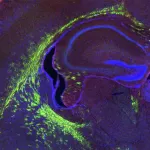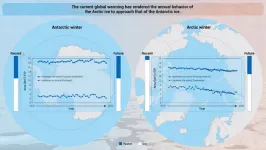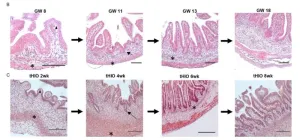(Press-News.org) SINGAPORE, 5 May 2023 – Scientists from Singapore have demonstrated the critical role played by a special transporter protein in regulating the brain cells that ensure nerves are protected by coverings called myelin sheaths. The findings, reported by researchers at Duke-NUS Medical School and the National University of Singapore in the Journal of Clinical Investigation, could help to reduce the damaging impacts of ageing on the brain.
An insulating membrane encasing nerves, myelin sheaths facilitate the quick and effective conduction of electrical signals throughout the body’s nervous system. When the myelin sheath gets damaged, nerves may lose their ability to function and cause neurological disorders. With ageing, myelin sheaths may naturally start to degenerate, which is often why the elderly lose their physical and mental abilities.
“Loss of myelin sheaths occurs during the normal ageing process and in neurological diseases, such as multiple sclerosis and Alzheimer’s disease,” said Dr Sengottuvel Vetrivel, Senior Research Fellow with Duke-NUS’ Cardiovascular & Metabolic Disorders (CVMD) Programme and lead investigator of the study. “Developing therapies to improve myelination—the formation of the myelin sheath—in ageing and disease is of great importance to ease any difficulties caused by declining myelination.”
To pave the way for developing such therapies, the researchers sought to understand the role of Mfsd2a, a protein that transports lysophosphatidylcholine (LPC)—a lipid that contains an omega-3 fatty acid—into the brain as part of the myelination process. From what is known, genetic defects in the Mfsd2a gene leads to significantly reduced myelination and a birth defect called microcephaly, which causes the baby’s head to be much smaller than it should be.
In preclinical models, the team showed that removing Mfsd2a from precursor cells that mature into myelin-producing cells—known as oligodendrocytes—in the brain led to deficient myelination after birth. Further investigations, including single-cell RNA sequencing, demonstrated that Mfsd2a’s absence caused the pool of fatty acid molecules—particularly omega-3 fats—to be reduced in the precursor cells, preventing these cells from maturing into oligodendrocytes that produce myelin.
“Our study indicates that LPC omega-3 lipids act as factors within the brain to direct oligodendrocyte development, a process that is critical for brain myelination,” explained Professor David Silver, the senior author of the study and Deputy Director of the CVMD Programme. “This opens up potential avenues to develop therapies and dietary supplements based on LPC omega-3 lipids that might help retain myelin in the ageing brain—and possibly to treat patients with neurological disorders stemming from reduced myelination.”
Previously, Prof Silver and his lab discovered Mfsd2a and worked closely with other teams to determine the function of LPC lipids in the brain and other organs. The current research provides further insights into the importance of lipid transport for oligodendrocyte precursor cell development.
“We’re now aiming to conduct preclinical studies to determine if dietary LPC omega-3 can help to re-myelinate damaged axons in the brain,” added Prof Silver. “Our hope is that supplements containing these fats can help to maintain—or even improve—brain myelination and cognitive function during ageing.”
“Prof Silver has been relentless in investigating the far-reaching role of Msdf2a ever since he discovered this important lipid transport protein, alluding to the many possible ways of treating not only the ageing brain but also other organs in which the protein plays a role,” said Professor Patrick Casey, Senior-Vice Dean for Research. “It’s exciting to watch Prof Silver and his team shape our understanding of the roles that these specialised lipids play through their many discoveries.”
END
A special omega-3 fatty acid lipid will change how we look at the developing and ageing brain, Duke-NUS researchers find
2023-05-05
ELSE PRESS RELEASES FROM THIS DATE:
Similar but different: Antarctic and Arctic sea ice and their responses to climate change
2023-05-05
Results were published on March 29 in Ocean-Land-Atmosphere Research. Researchers used data from previous publications aiming to answer the question of why the Arctic sea ice is responding much more quickly and obviously than the Antarctic sea ice, which has stayed relatively stable according to the long-term studies monitoring the Antarctic region’s sea ice patterns.
“The differences in responses are explained in terms of geographic, climatic and
meteorological differences between the two regions. Arctic sea ice is located in the
polar area and encircled by land, while sea ice in the Antarctic ...
Study identifies messages about vaccinating children against COVID-19 that resonate best with vaccine-hesitant parents
2023-05-05
A study from Ann & Robert H. Lurie Children’s Hospital of Chicago found that parents with children who were not yet vaccinated against COVID-19 were most likely to vaccinate their child after reading the following hypothetical scenario:
You hear from other parents you trust that they have vaccinated their children against COVID-19. Some of them say that they weren’t sure at first about whether the vaccine is safe for kids. But they ended up deciding that it was the best way to fight COVID-19, and the vaccination went fine. ...
Organoids validated as tool for studying fetal intestine development
2023-05-04
Developmental biologists have learned a great deal about how the human digestive tract functions through many years of studies involving fish, frogs, and rodents along with detailed explorations of individual human cells. But nothing quite matches the learning that could be achieved from studying actual human organ systems as they form.
Yet for obvious reasons, running experiments on growing human fetuses is both unethical and illegal.
Now a study led by researchers at Cincinnati Children’s, published online April 18, 2023, in the journal Development, reports that lab-grown tissues called organoids accurately mimic key development stages of the human intestine.
“Achieving ...
New free-to-read collection shares research on the Southwest Asian and North African region
2023-05-04
Sage has launched a free-to-read collection of research and other resources that explore the Southwest Asian and North African (SWANA) region. Categories in the collection include:
gender role and oppression
governments, laws, and policies
information and media
mental health, healthcare, and medicine
protests, conflicts, and war
refugees, displaced, and stateless people
Readers can access the Southwest Asia and North Africa microsite free for a limited time. END ...
Cleveland Clinic Rare Disease Center recognized as a National Center of Excellence by National Organization for Rare Disorders
2023-05-04
May 4, 2023, Cleveland: Cleveland Clinic has been designated a Rare Disease Center of Excellence by the National Organization for Rare Disorders (NORD). The new Cleveland Clinic Center for Rare Diseases is one of 40 U.S. academic medical centers selected to join the first-of-it-kind national network dedicated to diagnosing, treating and researching all rare diseases.
The NORD Rare Disease Centers of Excellence program provides a much-needed national infrastructure to help accelerate advancements for rare diseases. The network of medical institutions, led by NORD, is designed to improve rare disease patient care by connecting patients to appropriate specialists regardless of disease ...
Adding epigenetic drug to standard chemotherapy was effective in pilot study for T-cell lymphoma
2023-05-04
Nearly 90 percent of patients with an aggressive subtype of non-Hodgkin lymphoma had their cancer go into remission in a small phase 2 clinical trial testing a treatment aimed at making chemotherapy more effective, according to Weill Cornell Medicine and NewYork-Presbyterian investigators.
The clinical trial, whose results were published May 4 in Blood, included 17 patients with a type of blood cancer called peripheral T-cell lymphoma with T-follicular helper phenotype (PTCL-TFH), also known as angioimmunoblastic T-cell lymphoma. Fifteen of them (88.2 percent) had complete ...
What really killed COVID-19 patients: it wasn’t a cytokine storm
2023-05-04
· No evidence of cytokine storm in critically ill patients with COVID-19
· Nearly half of patients with COVID-19 develop a secondary bacterial pneumonia
· Crucial to find and aggressively treat secondary bacterial pneumonia in ICU patients
CHICAGO --- Secondary bacterial infection of the lung (pneumonia) was extremely common in patients with COVID-19, affecting almost half the patients who required support from mechanical ventilation. By applying machine learning to medical record data, scientists at Northwestern University Feinberg School of Medicine found that secondary bacterial pneumonia that does not resolve was a key ...
Many older adults take multiple medications; an updated AGS Beers Criteria® will help ensure they are appropriate
2023-05-04
New York (May 4, 2023) — Today, the American Geriatrics Society (AGS) released the 2023 update to the AGS Beers Criteria® for Potentially Inappropriate Medication Use in Older Adults (DOI: 10.1111/jgs.18372). The AGS Beers Criteria® serves as a comprehensive list of medications that older people should potentially avoid or consider using with caution because they often present unnecessary risks for this population. Given that, according to the National Center for Health Statistics, United States (NCHSUS), more than 88% of older people use at least one prescription and more than 66% use ...
Study presents new clues about the rise of earth’s continents
2023-05-04
Continents are part of what makes Earth uniquely habitable for life among the planets of the solar system, yet surprisingly little is understood about what gave rise to these huge pieces of the planet’s crust and their special properties. New research from Elizabeth Cottrell, research geologist and curator of rocks at the Smithsonian’s National Museum of Natural History, and lead study author Megan Holycross, formerly a Peter Buck Fellow and National Science Foundation Fellow at the museum and now an assistant professor at Cornell University, deepens the understanding of Earth’s crust by testing ...
Converging ocean currents bring floating life and garbage together
2023-05-04
The North Pacific “Garbage Patch” is home to an abundance of floating sea creatures, as well as the plastic waste it has become famous for, according to a study by Rebecca Helm from Georgetown University, US, and colleagues, publishing April 27th in the open access journal PLOS Biology.
There are five main oceanic gyres — vortexes of water where multiple ocean currents meet — of which the North Pacific Subtropical Gyre (NPSG) is the largest. It is also known as the North Pacific “Garbage Patch”, because converging ocean currents have concentrated large amounts ...






